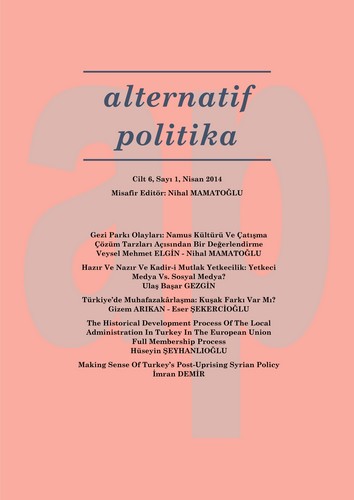Hazir Ve Nazir Ve Kadir-İ Mutlak Yetkecilik: Yetkeci Medya Vs. Sosyal Medya?
Omnipresent and Omnipotent Authoritarianism: Authoritarian Media vs. Social Media?
Author(s): Ulaş Başar GezginSubject(s): Media studies, Political psychology, Politics and communication, Theory of Communication, Sociology of Politics
Published by: Rasim Özgür DÖNMEZ
Keywords: Political Psychology; Authoritarianism; Rightwing authoritarianism; the Mainstream Media; and Social Media;
Summary/Abstract: This study reviews the empirical works on authoritarianism and discusses the distinctions between mainstream media (MM) and social media with regard to the major communication theories, models and approaches. For that purpose, political psychological research on right-wing authoritarianism (RWA) which consists of 3 dimensions (authoritarian submission, authoritarian aggression and conventionalism) is reviewed. In the previous research, RWA is found to be associated with a set of variables such as support for war, military intervention, attitudes toward violence, prejudice, age and cohort, endorsement of traditional gender roles, sexually aggressive beliefs etc. The presentation of the links between authoritarianism and intergroup relationships is followed by the discussion of RWA and social dominance orientation (SDO). The former refers to submissive authoritarians (masses), while the latter corresponds to dominating authoritarians (leaders). Previous research shows that authoritarians follow the norms set by authorities; and when the norms are not clear, they resort to other sources. For them, the world is a dangerous place, full of threats. Thus, authoritarianism appears as a response to feelings of threat. The critique of the individualism in early and recent authoritarianism studies leads the researchers to develop the notion of group authoritarianism which fares better with the complementary position of RWA and SDO. A contribution of this line of research is the emphasis on interactivity of authoritarian dispositions, feelings of threat, in-group identification and social context. Just like group authoritarianism, SDO provides a framework on the basis of groups. Not pathologizing the subject, SDO researchers investigate beliefs on social hierarchy and egalitarianism. The next discussion involves the notion of left-wing authoritarianism. Together, these provide the background for elaborating on authoritarianism, media and social media. The paper ends with future research ideas.
Journal: Alternatif Politika
- Issue Year: 6/2014
- Issue No: 1
- Page Range: 32-61
- Page Count: 30
- Language: English

